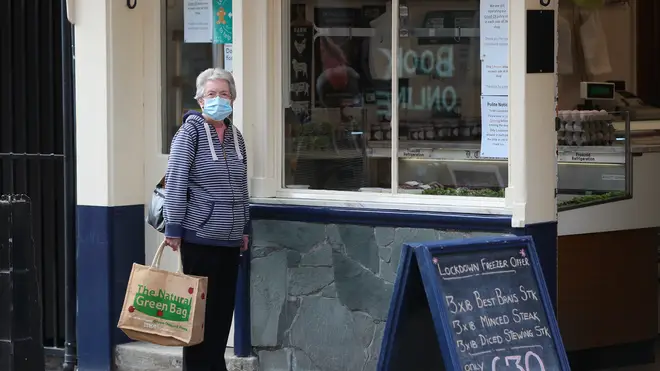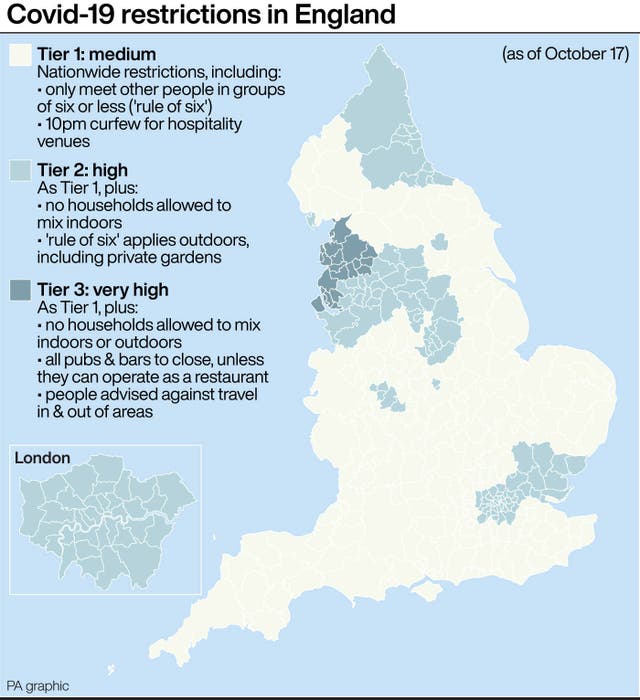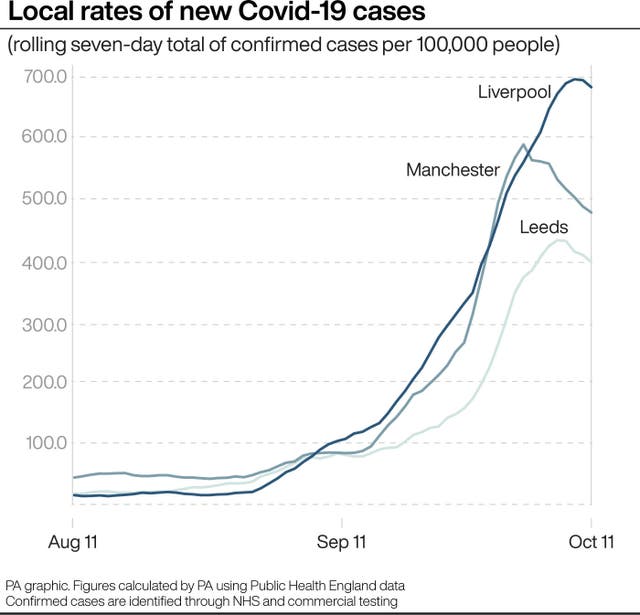
Richard Spurr 1am - 4am
16 October 2020, 15:04

The Covid-19 rate across the whole of Lancashire is 345.1 cases per 100,000, up from 241.2 in the previous week.
Another 1.5 million people in England will be placed under the toughest coronavirus restrictions this weekend as Lancashire moves into Tier 3.
The Government announced further measures to stem the “unrelenting rise” in Covid-19 cases in the North West county amid a furious row over restrictions in Greater Manchester.
Pubs and bars across Lancashire will close unless they serve food and alcohol as part of a sit-down meal from Saturday, while stricter restrictions on socialising will also come into force.
People will not be able to mix with others in any indoor setting or private garden, as well as in most outdoor hospitality venues.

Casinos, bingo halls, bookmakers, betting shops, soft play areas and adult gaming centres will be forced to shut, while car boot sales will also be banned.
But gyms will remain open despite them being closed in Liverpool City Region – the only other area of England under Tier 3 restrictions.
Liverpool Mayor Joe Anderson said he had “demanded immediate clarification on why Lancashire gyms are allowed to stay open and Liverpool’s close”.
Downing Street said it is up to regional leaders to decide whether gyms should be closed as part of Tier 3 restrictions.
Some local leaders in Lancashire were “reluctant” to agree to further restrictions, but sources said local councils had agreed an extra £30 million to help with the local test, trace and isolate and other measures.
Liverpool City Region has demanded immediate clarification on why Lancashire Gyms are allowed to stay open and Liverpools close. Inconsistent mess we now have Tier 3 A and Tier 3 B. Are Gym users in Lancashire more safer than those in Liverpool Region 😱 #COVID -19 #shambles
— Joe Anderson (@mayor_anderson) October 16, 2020
The new restrictions, which will be reviewed every fortnight, cover all parts of the county, including: Burnley, Blackburn with Darwen, Blackpool, Chorley, Fylde, Hyndburn, Lancaster, Pendle, Preston, Ribble Valley, Rossendale, South Ribble, West Lancashire and Wyre.
The coronavirus rate across the whole of Lancashire is 345.1 cases per 100,000, up from 241.2 in the previous week.
Health Secretary Matt Hancock said: “An unrelenting rise in cases in Lancashire means we must act now, and we have worked intensively with local leaders to agree on additional restrictions.
“I know how heavy these additional challenges will weigh on everyday life for the people of Lancashire but they are critical in bringing this virus under control.
“Without them, we risk the health of your loved ones, your most vulnerable, and your local NHS services. Now is the time to play your part, and we will make sure you are supported.”

Lancashire County Council leader Geoff Driver said: “Across Lancashire, the coronavirus situation is serious and getting worse.
“Lancashire’s leaders all agree that, as we approach winter, urgent action has to be taken now to ensure the county is not overwhelmed by the virus.
“After major negotiations with Government, we have agreed a bespoke deal for Lancashire that means our businesses and residents will receive extra support that will not be available elsewhere in the country.”
However, the Labour leader of South Ribble Borough Council in Lancashire, Paul Foster, said local leaders were “blackmailed and forced” by the Government to agree to the terms of the new restrictions.
And Mohammed Iqbal, Labour leader of Pendle Borough Council, said he does not think closing pubs and bars is the “right approach to bring down the level of Covid-19” in the borough.
A battle between local politicians and Westminster has so far prevented Greater Manchester also being moved into the “very high” risk category.
Foreign Secretary Dominic Raab accused the city’s mayor, Andy Burnham, of trying to “hold the Government over a barrel” by resisting tougher restrictions and urged him to “do the right thing by the people of Manchester”.
Mr Burnham has said that what is proposed goes far beyond just closing pubs and bars and is not guaranteed to bring the outbreak under control. MPs and other council chiefs have also criticised the plan.
Latest figures suggest that the weekly rate of new cases continues to rise in Liverpool. For the seven days to October 11 it stood at 676.6 per 100,000 people. This is up from 580.1 in the week before (seven days to October 4), and 342.7 the week before that (seven days to September 27).
By contrast, the weekly rate for Manchester has fallen. It was 473.0 cases per 100,000 people in the week to October 11, down from 558.0 in the week to October 4. Before that, in the week to September 27, it was 307.5.
Meanwhile, separate figures presented to Government scientists suggested around 47,000 Covid-19 infections are occurring daily across England, with deaths expected to hit 240 to 690 per day by October 26.
Yet the Office for National Statistics (ONS) estimated that there were an average of 27,900 new cases per day of Covid-19 in private households in England between October 2 and 8.
This is up from an estimated 17,200 new cases per day for the period from September 25 to October 1.
The Scientific Advisory Group for Emergencies (Sage) said the reproduction number, or R value, of coronavirus transmission for the whole of the UK is between 1.3 and 1.5.
Last week, the R number was between 1.2 and 1.5.
In a statement, Sage said: “There is no clear evidence that the epidemic’s trajectory has changed in the past month.”

Elsewhere:
– First Minister Mark Drakeford said the Welsh Government will be meeting over the weekend to discuss a circuit-breaker lockdown and announce any decisions on Monday. He said such a lockdown would be a “new set of national rules for the whole of Wales”.
– Nicola Sturgeon said a new tiered system in Scotland will “strengthen our resilience to live with this virus” when it replaces temporary measures due to end on October 25.
– Northern Ireland will enter the toughest controls in the UK so far with pubs and restaurants to close for four weeks as of Friday evening while schools face a two-week shutdown.